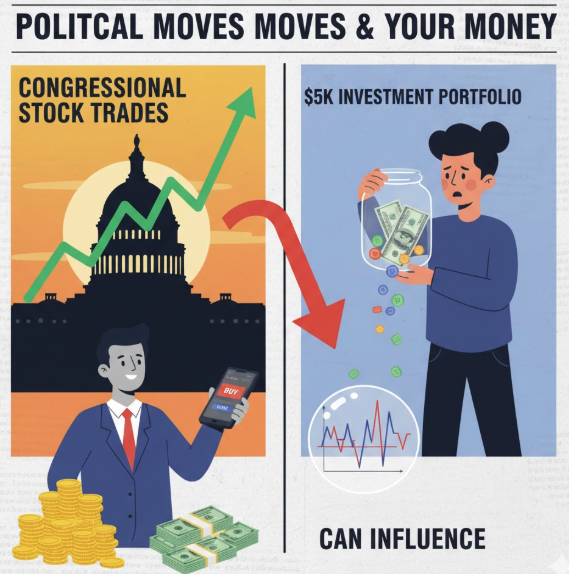Here's something most average investors may not consider: politicians who are making decisions in Washington D.C. are also trading stocks. And, what happens to be on their buy and sell lists may provide very powerful insights into the direction of the markets.
For the past few years congressional activity in the markets has taken center-stage in financial news. From tech developments to energy trades, congressmen's trades provide early insights into lawmakers' sentiment to and intentions about the economy. It is not so much whether or not you should copy them, but rather whether or not their behavior is significant enough to be on your radar.

When a senator increases their position in an industry, they are often showcasing their confidence based on information they understand. You should at least take notice - although you may not want to act on it unless you bring context to it.
How Congressional Stock Trading Actually Works
The STOCK Act was meant to call out this type of behavior. Passed in 2012, the Act requires members of Congress to disclose stock trades within 45 days (or 3 days if trading on certain platforms). No one is allowed to get an undeserved, sneaky, and illegal form of insider advantage in theory, but in practice, certain gaps exist.
Some members use blind trusts or trade stocks through certain family members to avoid ethical red flags, and then they cannot be told what the trust owns. In this sense, the member does not even know what he's owned for an unknown period of time. Other members create corporate accounts confusing to the average audit of the ownership structure. Yes, these members file disclosure forms, but they can't be understood without a detective.
What the Data Actually Shows
Research on congressional trading trends has shown that members of Congress do, on average, outperform the market. Data has shown patterns when evaluating stock performance before and after congressional trades. For example, we know that, where senators or representatives have increased their ownership positions in tech stocks, we have generally seen upward stock movement in the subsequent weeks and months. Similar movement occurs for energy stocks when members of specific committees increase their ownership in advance of an energy policy discussion.
But correlation is not causation; sometimes Congress trades on a legitimate investment thesis (strong companies or sectors of growth) and sometimes the stock moved for other reasons altogether, and perhaps they had nothing to do with the congressional trade that occurred. Just because one trades in a company does not mean they started or influenced the movement by their trade.
Smart Investment Strategies Using Congressional Trades as a Reference
One useful method combines congressional activity with other research. Once you’ve observed congressional members adding positions in a specific industry, the next question is why? Look at the most recent earnings reports, news articles and perspective on the economic outlook in that industry around the next quarter or one year out. Is this making sense and aligned with what you’re identifying in congressional activity, or is this contrary to that.
Diversification is key here. You shouldn't invest your entire $5,000 into a stock because a senator is doing the same - unless your risk tolerance allows that. However, maybe yes, it is warranted tweaking your portfolio allocation, once you recognize a cadence of activity from congressional members in combination with your own research.
What Global Markets Teach Us
The European Union has a stricter disclosure system for EU Commission members than the United States, in some respects. For example, members must disclose trades within days, rather than weeks.
The transparency principle extends beyond just the members of the European Union to include other political officials and other classes of assets. Similarly, in Canada, there are legislation like this that applies, but the enforcement of these regulations may depend on your province or the Federal jurisdiction.
Start Investing With More Information
While trades made by Congress aren't a foretelling of market movements, it provides a data point to learn about. When trade data is used in conjunction with good research and a smart risk profile for a specific trade, you will be in a better informed position.
We encourage you to investigate the tools available to track and measure congressional trading activity to make it part of your research routine and investment process. Please visit Tradewill and learn how trading platforms with good data intelligence can help you identify opportunities faster and improve your risk profile.
For more info:-
forex trading platforms
online trading platform